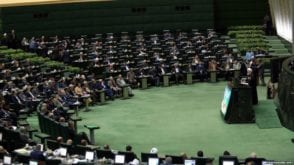HRW – During the last week of June, Iranian authorities intensified their crackdown on civil society with a new wave of politically-motivated arrests and sentences against journalists and activists, including Vida Rabani, Ahmad Reza Haeri, Amir Salar Davoudi, and Masoud Bastani.
On July 4, Emtedad news outlet reported that the Evin prosecutor’s office summoned Masoud Bastani, a journalist. Two days earlier, on July 2, security agents searched Masoud’s home and confiscated his personal belongings and the laptop of his wife Mira Ghorbanifar, who is also a journalist.
On June 29, Vida Rabani, a journalist, posted on her Twitter that a court had sentenced her to five years in prison and a five-year ban from professional activities and media appearances on charges of “insulting the sacred” because of a poem she posted on social media and “assembly and collusion against national security,” because she shared tweets from two other Iranian activists, Zia Nabavi and Mostafa Tajzadeh.
Two days earlier, on June 27, authorities arrested Ahmad Reza Haeri, a human rights defender and former political prisoner, at his home, Emtedad news outlet reported. This arrest was based on the order of Branch 3 of the Evin prosecutor’s office. According to the Human Rights Activists News Agency (HRANA), on June 1, the Islamic Revolutionary Guard Corps (IRGC)’s intelligence agents searched Haeri’s home, took his personal belongings, and told him to report to the Evin prosecutor’s office. Haeri had previously been summoned by the cybercrime prosecutor’s office in November and December 2021 as part of a complaint against him by the Tehran General Directorate of Prisons.
HRANA also reported that on June 26 the Evin prosecutor’s office arrested Amir Salar Davoudi, a human rights lawyer, to serve a 10-year prison sentence he received in 2021. In December 2021, Branch 36 of the Tehran Court of Appeals upheld Davoudi’s sentence of two years in prison for “insulting the supreme leader,” two years for “disturbing public opinion,” and ten years for “forming a group to act against national security.” Under article 134 of Iran’s penal code, he has to serve the longest sentence, which is 10 years.
In recent months, Iranian authorities have escalated arrests of prominent members of teachers’ unions and labor activists on baseless accusations in an attempt to silence support for growing popular social movements in the country.
 Shabtabnews In this dark night, I have lost my way – Arise from a corner, oh you the star of guidance.
Shabtabnews In this dark night, I have lost my way – Arise from a corner, oh you the star of guidance.



